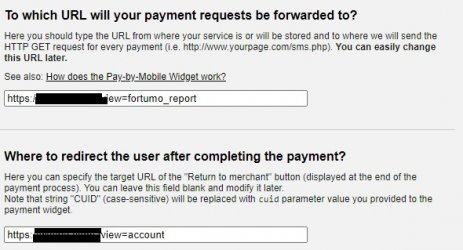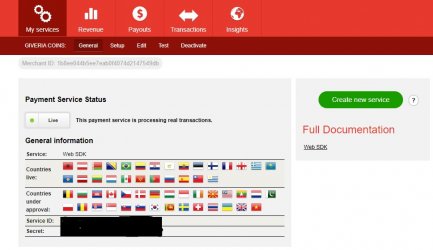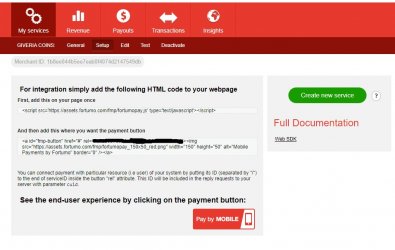damian00912
Member
- Joined
- Sep 11, 2009
- Messages
- 90
- Reaction score
- 6
Hei. Can someone help me with this??
I want make Fortumo Payment sms on gesior acc and i have this script for check after payment succesfully, but i don't know how add sql to database. Can someone help me?
also they have on official website example:
In order to handle and process the values sent to your callback URL you need implement a script hosted at your service backend.
The following example Receipt Verification script is called whenever an user makes a payment. The script first makes security checks (validate IP addresses, check the signature) to validate that the request came from Fortumo. Then the script processes the $_GET['product_name'] and $_GET['status'] parameters and grants virtual items to the user who made the purchase.
Example URL: https://yourdomain.com/in-app-payment.php
The payment processor does not need to be written in PHP, any other server side technology (.NET, Java, Ruby on Rails) will work as well. This response is considered successful and notification delivered if your server responds with code 200, otherwise the request will be repeated up to 20 times with growing intervals. The body of your response will not be processed or forwarded.
Notification example - sandbox
Notification examples - live
In order to handle and process the values sent to your callback URL you need implement a script hosted at your service backend.
The following example Receipt Verification script is called whenever an user makes a payment. The script first makes security checks (validate IP addresses, check the signature) to validate that the request came from Fortumo. Then the script processes the $_GET['product_name'] and $_GET['status'] parameters and grants virtual items to the user who made the purchase.
ALSO I HAVE THIS FROM MYACC. SOMEONE CAN CHANGE THIS TO GESIOR ACC?
I want make Fortumo Payment sms on gesior acc and i have this script for check after payment succesfully, but i don't know how add sql to database. Can someone help me?
PHP:
))) {
header("HTTP/1.0 403 Forbidden");
die("Error: Unknown IP");
}
// read $_GET from Fortumo servers
$sender = $_GET['sender'];//phone num.
$amount = $_GET['amount'];//credit
$payment_id = $_GET['cuid'];//unique id
$custom = $_GET['custom'];
$country = $_GET['country'];
$currency = $_GET['currency'];
$service_id = $_GET['service_id'];
$operator = $_GET['operator'];
$status = $_GET['status'];
$price = $_GET['price'];
$points = $_GET['amount'];
$created = time();
$ip = $_SERVER['REMOTE_ADDR'];
$con=mysqli_connect("localhost","root","passwd","database");
// Check connection
if (mysqli_connect_errno())
{
echo "Failed to connect to MySQL: " . mysqli_connect_error();
}
$result = mysqli_query($con, "SELECT * FROM z_fortumo WHERE 'payment_id' != '$payment_id'") or die(mysqli_error($con));
if ($result && $payment_id != "undefined"){
//id, account_id, price,service_id,points,operator,payment_id,sender,currency,status,ip,created
mysqli_query($con,"INSERT INTO z_fortumo VALUES ('', '$payment_id', '$price', '$service_id', '$points', '$operator', '$sender', '$currency', '$status', '$ip', '$created')");
// update the points in database
mysqli_query($con,"UPDATE accounts SET premium_points = premium_points + '$points' WHERE id = '$payment_id'");
$count->close();
mysqli_close($con);
}
?>also they have on official website example:
Processing the receipt verification request
Receipt verification is a convenient way for integrating in-app purchases with users online profile so that in-app purchases can be kept track of and shared between different devices and platforms. Receipt verification can also be used to gather live statistics about purchases made and integrate data with your live dashboard or accounting systems.In order to handle and process the values sent to your callback URL you need implement a script hosted at your service backend.
The following example Receipt Verification script is called whenever an user makes a payment. The script first makes security checks (validate IP addresses, check the signature) to validate that the request came from Fortumo. Then the script processes the $_GET['product_name'] and $_GET['status'] parameters and grants virtual items to the user who made the purchase.
PHP:
<?php
// check that the request comes from Fortumo server
if(!in_array($_SERVER['REMOTE_ADDR'],
//add Fortumo hosted ip addresses inside the 'array'.
array('1.2.3.4', '2.3.4.5'))) {
header("HTTP/1.0 403 Forbidden");
die("Error: Unknown IP");
}
// check the signature
$secret = ''; // insert your secret between ''
if(empty($secret)||!check_signature($_GET, $secret)) {
header("HTTP/1.0 404 Not Found");
die("Error: Invalid signature");
}
$sender = $_GET['sender'];//phone num.
$amount = $_GET['amount'];//credit
$cuid = $_GET['cuid'];//resource i.e. user
$payment_id = $_GET['payment_id'];//unique id
$test = $_GET['test']; // this parameter is present only when the payment is a test payment, it's value is either 'ok' or 'fail'
//hint: find or create payment by payment_id
//additional parameters: operator, price, user_share, country
if(preg_match("/completed/i", $_GET['status'])) {
// mark payment as successful
}
// print out the reply
if($test){
echo('TEST OK');
}
else {
echo('OK');
}
function check_signature($params_array, $secret) {
ksort($params_array);
$str = '';
foreach ($params_array as $k=>$v) {
if($k != 'sig') {
$str .= "$k=$v";
}
}
$str .= $secret;
$signature = md5($str);
return ($params_array['sig'] == $signature);
}
?>
Home- Integration and Testing
- Web SDK
- Payment Result Processing
Payment result processing
When someone completes a payment, Fortumo will inform service providers’ servers by making a HTTP GET request to the URL that was specified in the service configuration.Example URL: https://yourdomain.com/in-app-payment.php
The payment processor does not need to be written in PHP, any other server side technology (.NET, Java, Ruby on Rails) will work as well. This response is considered successful and notification delivered if your server responds with code 200, otherwise the request will be repeated up to 20 times with growing intervals. The body of your response will not be processed or forwarded.
Notification parameters
| Parameter | Type | Required | Description |
|---|---|---|---|
| service_id | String | Mandatory | Specific service you have created on Fortumo dashboard. Example: e2bbf830a55f565375915a94f3309cc |
| cuid | String | Mandatory | Specific user record internal to your system. Helps you match every payment to a specific user of your service. In order to prevent fraud we can limit how often one cuid can make a payment. To use this feature please contact Fortumo customer support. Example: Username21 |
| operation_reference | String | Optional | Matches every specific Fortumo payment to specific orders internal to your system. Different from cuid in that it should be unique per every transaction. Example: order_12345 |
| price | Float, 2 decimals | Mandatory | Overrides the virtual currency exchange rate specified on Fortumo dashboard. Price parameter defines the real currency base amount and should be used together with parameters currency and amount. Example: 5.00 |
| price_wo_vat | Float, 2 decimals | Mandatory | End-user price in local currency without VAT (Value Added Tax) (float, 2 decimals). Example: 0.27 |
| revenue | Float, 2 decimals | Mandatory | Revenue in local currency. Example: 0.13 |
| currency | String, ISO 4217 | Mandatory | Overrides the virtual currency exchange rate specified on Fortumo dashboard. Currency parameter specifies the real currency against which virtual currency is converted to. Example: EUR |
| amount | Integer | Mandatory | Overrides the virtual currency exchange rate specified on Fortumo dashboard. Amount parameter specifies the number of virtual credits that are being sold for the real price and currency also specified in the payment request. Example: 100 |
| sender | String | Mandatory | Phone number. Can be in standard format or hash(sometimes operators encode the phone number for security and privacy measures). Example: 37256455115 or #a2001sdf1993fc7 |
| country | String, ISO Alpha-2 | Mandatory | Preselects consumer country. Can be useful in case your consumers are known to use VPNs, but you have knowledge about their real location. Example: MY |
| operator | String | Mandatory | Operator name. Example: Vodafone |
| payment_id | String | Mandatory | Unique payment id. Example: 32 or hash dc06a486787906f4b88dc74740f82c99 |
| status | Boolean | Mandatory | Status of the payment. Example: completed / failed |
| user_share | Float, 2 decimals | Mandatory | Merchant share % from the transaction. Example: 0.75 |
| sig | String | Mandatory | Used to verify the information in this request. Example: 136cc6f53d62afd45ac849674259f703 |
| test | Boolean | Optional | This parameter is present only when the payment is a test payment. Example: ok / fail |
Processing the receipt verification request
Receipt verification is a convenient way for integrating in-app purchases with users online profile so that in-app purchases can be kept track of and shared between different devices and platforms. Receipt verification can also be used to gather live statistics about purchases made and integrate data with your live dashboard or accounting systems.In order to handle and process the values sent to your callback URL you need implement a script hosted at your service backend.
The following example Receipt Verification script is called whenever an user makes a payment. The script first makes security checks (validate IP addresses, check the signature) to validate that the request came from Fortumo. Then the script processes the $_GET['product_name'] and $_GET['status'] parameters and grants virtual items to the user who made the purchase.
| 1 2 3 4 5 6 7 8 9 10 11 12 13 14 15 16 17 18 19 20 21 22 23 24 25 26 27 28 29 30 31 32 33 34 35 36 37 38 39 40 41 42 43 44 45 46 47 48 49 50 51 52 53 | <?php // check that the request comes from Fortumo server if(!in_array($_SERVER['REMOTE_ADDR'], //add Fortumo hosted ip addresses inside the 'array'. array('1.2.3.4', '2.3.4.5'))) { header("HTTP/1.0 403 Forbidden"); die("Error: Unknown IP"); } // check the signature $secret = ''; // insert your secret between '' if(empty($secret)||!check_signature($_GET, $secret)) { header("HTTP/1.0 404 Not Found"); die("Error: Invalid signature"); } $sender = $_GET['sender'];//phone num. $amount = $_GET['amount'];//credit $cuid = $_GET['cuid'];//resource i.e. user $payment_id = $_GET['payment_id'];//unique id $test = $_GET['test']; // this parameter is present only when the payment is a test payment, it's value is either 'ok' or 'fail' //hint: find or create payment by payment_id //additional parameters: operator, price, user_share, country if(preg_match("/completed/i", $_GET['status'])) { // mark payment as successful } // print out the reply if($test){ echo('TEST OK'); } else { echo('OK'); } function check_signature($params_array, $secret) { ksort($params_array); $str = ''; foreach ($params_array as $k=>$v) { if($k != 'sig') { $str .= "$k=$v"; } } $str .= $secret; $signature = md5($str); return ($params_array['sig'] == $signature); } ?> |
Verifying Fortumo notification signature
The signature is added as sig parameter and is calculated as md5 checksum of the request parameters and secret concatenated together. You can find your service secret from the service settings page on Fortumo.com Dashboard. To check whether the sig parameter in the notification matches the one that you calculated you can make the same calculation.Before calculating the signature:
- It is important to sort the parameters alphabetically.
- Parameter values (e.g. callback_url) should be URL decoded (though they have to be encoded prior to composing payment URL).
- Exclude sig parameter from the signature calculation.
PHP:
PARAMETERS
credit_name = gold
tc_amount = 3333
tc_id = 291
test = ok
secret = bad54c617b3a51230ac7cc3da398855e
CALCULATION STRING
credit_name=goldtc_amount=3333tc_id=291test=okbad54c617b3a51230ac7cc3da398855e
MD5 RESULT AS SIGNATURE
sig = 047f555536f8826825c9079265ad36de
Post automatically merged:
ALSO I HAVE THIS FROM MYACC. SOMEONE CAN CHANGE THIS TO GESIOR ACC?
PHP:
<?php
/**
* This is shop system taken from Gesior, modified for MyAAC.
*
* @name myaac-gesior-shop-system
* @author Gesior <[email protected]>
* @author Slawkens <[email protected]>
* @website github.com/slawkens/myaac-gesior-shop-system
*/
require_once '../common.php';
require_once SYSTEM . 'functions.php';
require_once SYSTEM . 'init.php';
require_once LIBS . 'shop-system.php';
require_once PLUGINS . 'gesior-shop-system/config.php';
if(!isset($config['fortumo']) || !count($config['fortumo']) || empty($config['fortumo']['service_id'])) {
log_append('fortumo_debug.log', 'Fortumo is disabled. IP: ' . $_SERVER['REMOTE_ADDR']);
header("HTTP/1.0 404 Not Found");
die("Error: Fortumo is disabled");
}
// check that the request comes from Fortumo server
if(!in_array($_SERVER['REMOTE_ADDR'], array('54.72.6.23', '54.72.6.126', '54.72.6.27', '54.72.6.17', '79.125.125.1', '79.125.5.95', '79.125.5.205'))) {
log_append('fortumo_scammer.log', $_SERVER['REMOTE_ADDR']);
header("HTTP/1.0 403 Forbidden");
die("Error: Unknown IP");
}
// check the signature
$secret = $config['fortumo']['secret'];
if(empty($secret) || !check_signature($_GET, $secret)) {
log_append('fortumo_debug.log', 'Invalid signature: ' . $secret);
header("HTTP/1.0 404 Not Found");
die("Error: Invalid signature");
}
if($_GET['status'] != 'completed')
{
log_append('fortumo_debug.log', 'Transaction status: ' . $_GET['status']);
return;
}
$account = new OTS_Account();
$account_id = (int)$_GET['cuid'];
$account->load($account_id);
if($account->isLoaded()) {
$points = (int)$_GET['amount'];
if(GesiorShop::changePoints($account, $points)) {
$time = date('d.m.Y, g:i A');
$account_id = $account->getId();
$price = $_GET['price'];
$currency = $_GET['currency'];
$payment_id = $_GET['payment_id'];
$service_id = $_GET['service_id'];
$country = $_GET['country'];
$operator = $_GET['operator'];
$sender = $_GET['sender'];
log_append('fortumo.log', "$time;$account_id;$points;$price:$currency;$payment_id;$service_id;$country;$operator;$sender");
}
}
else
log_append('fortumo_debug.log', 'Invalid account used: ' . $account_id . '. Payment id: ' . $_GET['payment_id']);
function check_signature($params_array, $secret)
{
ksort($params_array);
$str = '';
foreach ($params_array as $k=>$v) {
if($k != 'sig') {
$str .= "$k=$v";
}
}
$str .= $secret;
$signature = md5($str);
return ($params_array['sig'] == $signature);
}
Last edited:



